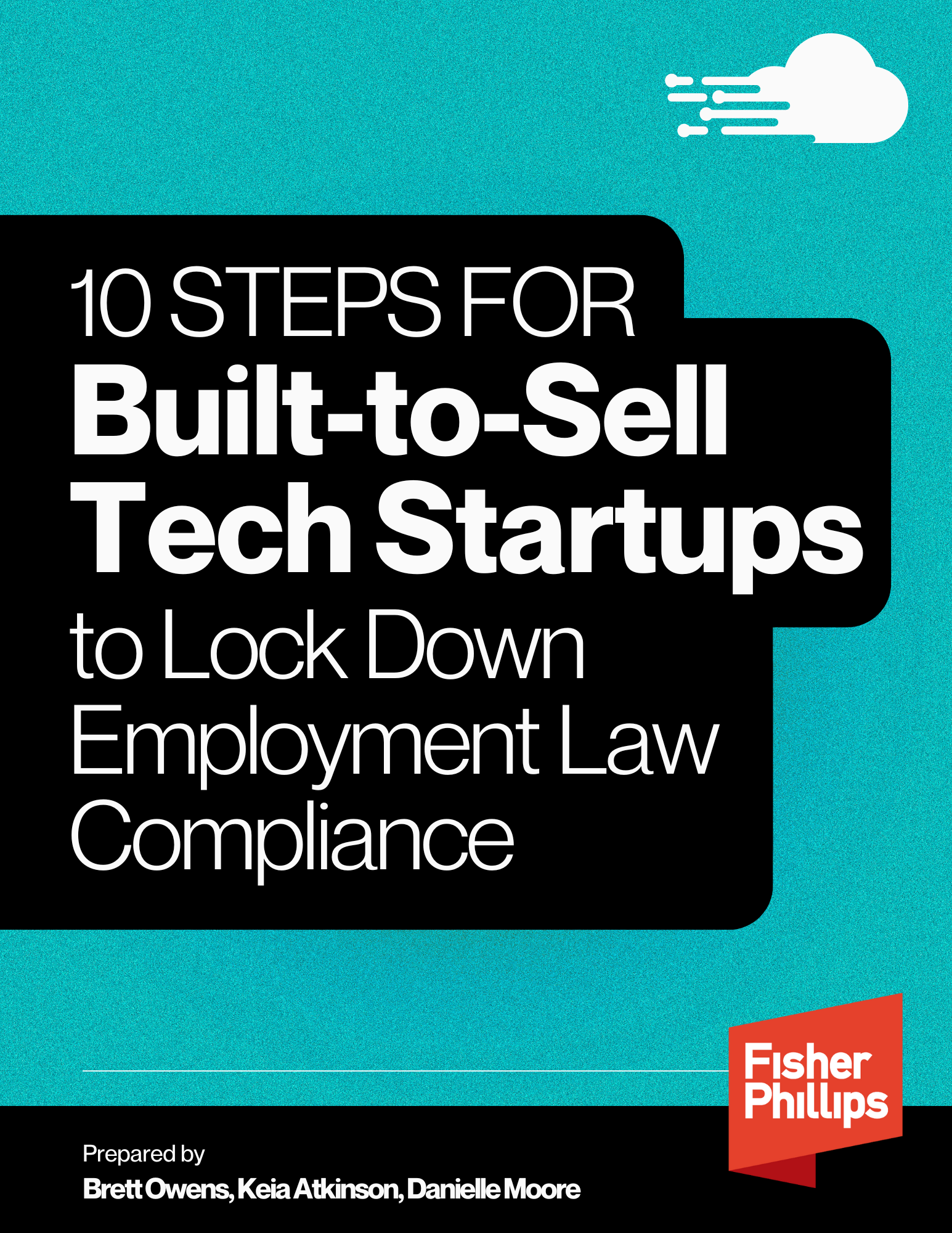10 Steps for Built-to-Sell Tech Startups to Lock Down Employment Law Compliance
Insights
8.14.25
You’ve built a great product, assembled a talented team, and maybe even caught the attention of investors or potential buyers. But your code or growth metrics will only get you so far if your company is not a compliant acquisition-ready business – and your compliance with workplace laws plays a major role in that. This guide will walk you through a non-exhaustive list of employment law best practices every startup founder should implement before you begin to position your company for a streamlined acquisition.
Click here to view or download copy of this report.
1. Classify Workers Correctly: Employees vs. Independent Contractors
Misclassification of workers is one of the most common – and most costly – issues uncovered during due diligence. Where a worker is misclassified, the employer may be liable for a penalty to the state, overtime, missed meal periods, missed rest periods, wage statement penalties and waiting time penalties, among other things. In a startup environment where workers often work very long hours, the damages can be significant.
|
Best practices:
|
2. Ensure Offer Letters and Agreements Are Clear and Legally Sound
Investors and acquirers want to know your employment terms are transparent and enforceable. You also want to ensure that you haven’t contractually given away certain rights to your company or promised obligations in the event of a sale.
|
Best practices:
|
3. Maintain Compliant Payroll and Wage Practices
Wage and hour violations can lead to significant liabilities – including penalties, interest, and class action exposure.
|
Best practices:
|
4. Document Your Equity Grants and Make Sure They’re Cap Table-Ready
Unclear or undocumented equity promises can derail M&A deals and dilute your equity.
|
Best practices:
|
5. Protect Company IP and Trade Secrets
Acquirers will expect full assurance that your company owns its intellectual property. As a result of increased competition and consolidation, talent is already at a premium. Venture capitalists and companies investing in and acquiring startups conduct rigorous due diligence related to key executives, trade secrets, confidential information, noncompetition agreements, and the management of project-related data. For many start-ups, much of their value is derived from their key executives and any proprietary or trade secret information.
|
Best practices:
|
Click here to view or download copy of this report.
6. Develop Proactive Dispute Resolution and Risk-Reduction Policies
Well-drafted policies can prevent minor employment disputes from turning into costly litigation – or at least give you a more predictable, controlled forum for resolution. For many tech startups, this means considering agreements such as arbitration clauses, jury trial waivers, and class/collective actions. These agreements can be particularly valuable in industries where a single misstep can spark a high-stakes class action.
|
Best practices:
|
7. Implement Basic HR Infrastructure Early
Investors want to see a scalable, professional operation, and performance management practices.
|
Best practices:
|
8. Be Prepared for Employment- and Benefits-Related Due Diligence Requests
During acquisition, your buyer will request detailed employment records and policies, as well as a wide range of documentation related to your employee benefits plans. These requests alone can be extremely overwhelming for deal teams, which are typically small, to handle, and there are, of course, many other due diligence categories and pieces of the deal.
You can give a gift to your future deal team by organizing these documents early and starting to assemble a clean data room long before a buyer is even in the picture.
|
Best practices:
|
9. Avoid “Founders First” Compensation Structures
Acquirers want to see fair treatment of your team, not just a windfall for founders. A team that has been treated fairly is more likely to stick around post-acquisition, adding to the value of the company long-term.
|
Best practices:
|
10. Plan for Clean Employee Transitions Post-Acquisition
Buyers want to retain key talent without inheriting problems.
|
Best practices:
|
BONUS SECTION!
Understand the “Golden Parachute” Rules As Early As Possible
Tech M&A deals often trigger the so-called “golden parachute” rules under Sections 280G and 4999 of the Internal Revenue Code, and these draconian tax rules can hit tech startups especially hard when they apply.
Golden Parachute Rules. The rules under Section 280G are extremely complex, but, in a nutshell:
- They apply when “disqualified individuals” – certain officers, shareholders, or highly-compensated employees – may become entitled to certain “parachute payments” that are contingent on a change in ownership or effective control of the company making the payment (if the company is a C corporation, whether public or private).
- When these rules apply, the individuals receiving those payments must pay a 20% excise tax on any “excess parachute payment” – and the corporation making those payments is banned from taking a tax deduction for that amount. In addition, buyers will absolutely care about potential 280G liability, and these issues can impact or even hold up the deal.
- The “excess parachute payment” amount, if any, depends on how much the parachute payments exceed the individuals “base amount,” which is essentially their average includible compensation over a 5-year base period.
The reason these rules can be even harsher for “built to sell” tech startups is because founders and other key players often take low salaries (or even none at all) during that 5-year base period – and a low base amount makes it much easier for parachute payments to exceed the 280G threshold (3x the base amount) and increases the size of the excess parachute payment (and therefore the amount of the excise tax and deduction loss).
The good news for private C corps is that the excise tax and deduction allowance that would otherwise apply can be completely avoided by meeting the requirements of the “shareholder approval” exception. However, this involves a somewhat risky, and sometimes contentious, process.
|
Best Practices:
|
Click here to view or download copy of this report.
Conclusion
Make sure you are subscribed to Fisher Phillips’ Insight System to receive the latest content relevant to your tech business. If you have questions about employment compliance or preparing your startup for acquisition, please feel free to contact the authors of this Insight, your Fisher Phillips attorney, or any attorney on our Tech Industry Team or M&A Practice Group for strategic guidance tailored to your stage and industry.
Related People
-
- Keia James Atkinson
- Partner
-
- Danielle H. Moore
- Executive Partner, Management Committee
-
- Brett P. Owens
- Partner




